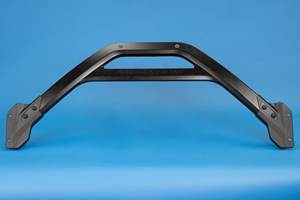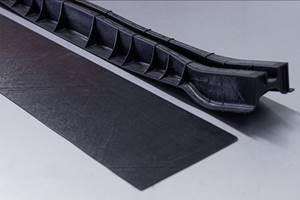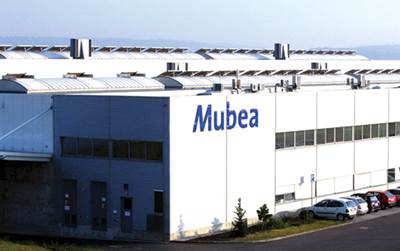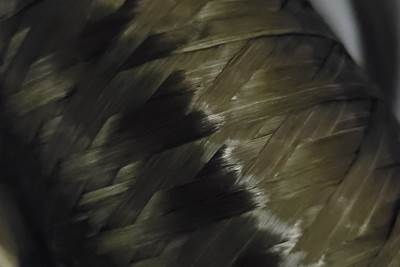Fiberject process achieves 3D thermoplastic cosmetic carbon parts
Mubea Carbo Tech develops manufacturing of complex-shaped, fully integrated and high-accuracy cosmetic CFRP components for high volumes using a thermoplastic matrix.
Fiberject for complex-shaped CFRTP components
To enable high-volume production of complex-shaped and fully integrated carbon fiber-reinforced plastic (CFRP) components, Mubea Carbo Tech GmbH (MCT, Salzburg, Austria) has developed a novel process that combines the freedom of design from conventional thermoset technology with the myriad advantages of thermoplastic composites. The Fiberject process first produces a 3D cosmetic organosheet and then further processes this material to create high-quality, complex-shaped and fully-integrated cosmetic CFRTP components. To validate this patented technology, MCT worked with Porsche AG (Stuttgart, Germany) and demonstrated a cosmetic CFRP component based on geometry from a series product.
Recognized as a finalist for the JEC Innovation Awards 2019 in the Automotive category, MCT’s development of the Fiberject process was explained by MCT project leader Christina Theobald. The information below is a summary of Theobald’s explanation for JEC.
Beyond thermoset prepreg and organosheet limits
Cosmetic carbon fiber reinforced plastic (CFRP) components are typically made from prepregs or thermoplastic organosheets. When using thermoset resins, such components are limited in lot size and productivity due to numerous process steps that demand accurate manual labor. Already near their technical limits, cycle times for preforming, curing and completion, are also an issue. Further, functional elements like clips or mounting points must be manufactured separately and glued to the component. Meanwhile, organosheets have technical limits. Complex shapes with undercuts, split lines or those requiring a high degree of draping cannot be realized.
With Fiberject, however, MCT can produce the most demanding shapes and still achieve cosmetic CFRP without wrinkles or warpage. These intermediate products can then be overmolded to integrate functional elements into the parts while achieving higher-precision positioning versus manual gluing.
Cosmetic CFRP experience – mew material
MCT has a long experience in the field of cosmetic CFRP components and the optimization of those components by using thermoplastic materials to reduce paint efforts. Based on this experience, MCT focused on a new process and developed a special thermoplastic compound to meet the highest automotive standards, even enabling an exterior part without protective clear coat. This, in turn, offers the possibility for use in automotive interior components by avoiding volatile organic compounds (VOCs). The final parts show a superior surface quality compared to current state-of-the-art components, including high clarity and an intense depth.
Reduced cycle time and cost
Fiberject also delivers increased efficiency in cost and cycle time. Using the example of a complex mirror cap, with Fiberject the overall production time has been reduced by over 85 percent compared to a conventional prepreg process. Depending on the complexity of a given geometry, Fiberject enables a cost reduction of up to 50 percent when compared to conventional thermoset cosmetic CFRP. It also is the first system to realize geometries which cannot be achieved with conventional organosheets while delivering fully-integrated and cosmetic parts using thermoplastics for volumes of more than 20,000 parts per year.
The Fiberject process can also reduce raw material costs by 20 percent compared to state-of-the-art organosheets, and without limits in draping, forming and component size. By first manufacturing 3D organosheets, thickness can be tailored per application and reduce carbon fiber usage. The manufactured components can be recycled, especially enabled by the ability to eliminate a clear coat.
Applications and accuracy
In addition to typical cosmetic applications like mirror caps, covers and diffusors, large components like roofs, bonnet hoods and door covers are possible. Functionalization of such components by overmolding drastically reduces the tolerance chain compared to thermoset components. More specifically, parts can be mounted without any problems, reproducible gap sizes can be achieved and reject rates are reduced significantly due to the high stability of the overmolding process.
Collaborative development and validation
MCT and Porsche decided in 2016 to further develop the technology to a serial manufacturing process. Porsche selected the mirror housing demonstrator, representing one of the most challenging geometries for a cosmetic CFRP component. Porsche also specified the required testing criteria for a premium class automotive exterior component. Component design and validation testing were completed according to Porsche specifications, while MCT developed the Fiberject technology. The companies worked together to industrialize the process and complete all necessary testing for validation.
Development was completed in 2018, after setting up the complete process chain and validating the desired high-volume production. All required testing was successful, including dynamic tests (climate shaker testing) and typical surface tests. The technology is ready for commercial use.
Potential market and continued focus
Cosmetic CFRP components is a growing business in the automotive area, with an estimated market value of €250 million. Based on the following benefits, Fiberject has the potential to capture up to a 50 percent share of this market:
- Good visual appearance, higher clarity and depth effect than standard CFRP.
- Possibility to manufacture complex cosmetic CFRP components using thermoplastics
- Cycle time reduction of 85 percent and cost reduction of up to 50 percent
- Usable for interior and exterior applications with the possibility to avoid VOCs.
- Recyclability due to the usage of a thermoplastic matrix.
With 1,300 employees working in three factories in Austria and the Czech Republic, Mubea Carbo Tech is global leader in serial production of cosmetic and structural carbon composite components for the premium automotive industry. Established in 1993 in the motorsports market, MCT very quickly grew its activities into series production with cosmetic prepreg parts. Every year, new technologies and increasingly complex applications helped MCT to enlarge its applications and customer base. Significant milestones began with series production of the McLaren monocoque, followed by launch of the first industrialized hybrid CFRP wheels for BMW and Rolls Royce. The MCT-wheels are opening a completely new market for the carbon fiber composites industry with impressive performance improvements and weight savings. A part of the Mubea Group since 2010, MCT is a €2.4 billion Tier 1 supplier for body, chassis and powertrain components. This solid base enables MCT to now focus on developing new technologies for increasingly larger-volume applications.
Related Content
Seat frame demonstrates next-generation autocomposites design
Light weight, simplified/cost-effective manufacturing, passenger comfort and safety informed materials and process innovations and won awards for the 2022 Toyota Tundra‘s second-row seat frame.
Read MorePlant tour: National Institute for Aviation Research, Wichita, Kan., U.S.
NIAR, located at Wichita State University in the heart of the American aerospace manufacturing industry, has evolved to become a premier hub of teaching, R&D, creativity and innovation.
Read MoreAutomotive chassis components lighten up with composites
Composite and hybrid components reduce mass, increase functionality on electric and conventional passenger vehicles.
Read MoreOptimized approach to predict delamination failure in CFRTP structures
ARRK Engineering and Mitsui Chemicals improved delamination prediction accuracy to help optimize absorbed energy/failure load for an overmolded TAFNEX CF/PP UD tape bumper beam.
Read MoreRead Next
Mubea Carbo Tech: High-quality auto composites go high-volume
Known for its precision and technical acumen in CFRP motorsports structures, MCT draws from its steel auto parts parent to push high-performance and industrial production to new plateaus.
Read MoreCW’s 2024 Top Shops survey offers new approach to benchmarking
Respondents that complete the survey by April 30, 2024, have the chance to be recognized as an honoree.
Read MoreFrom the CW Archives: The tale of the thermoplastic cryotank
In 2006, guest columnist Bob Hartunian related the story of his efforts two decades prior, while at McDonnell Douglas, to develop a thermoplastic composite crytank for hydrogen storage. He learned a lot of lessons.
Read More

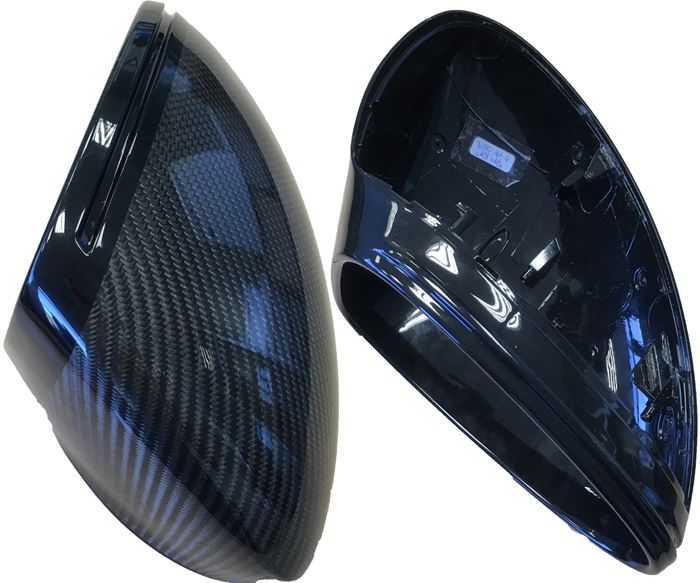
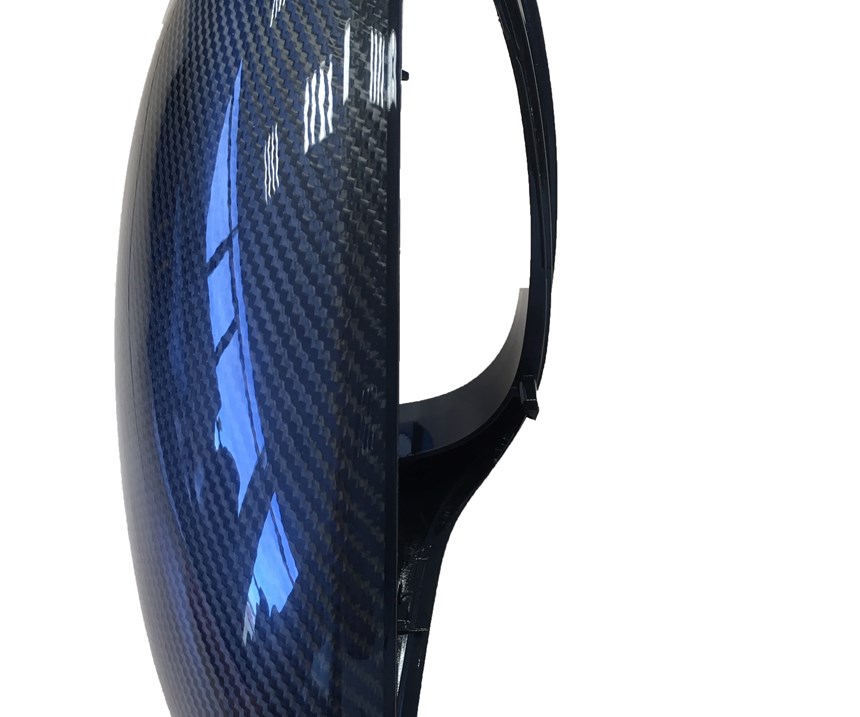
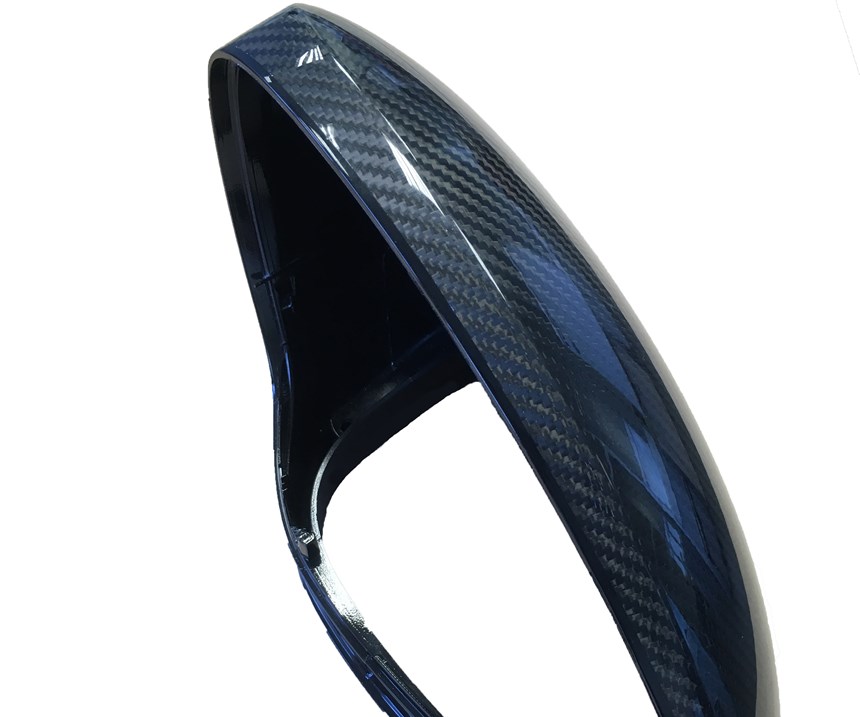




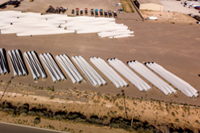


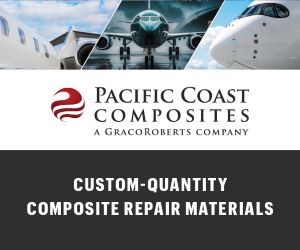


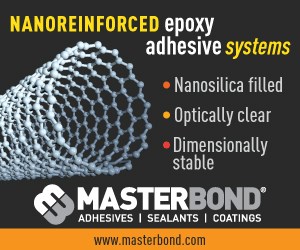





.jpg;maxWidth=300;quality=90)


